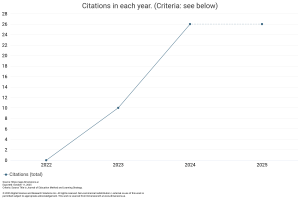Design of Group Investigation (GI) Learning Model assisted by animation media to social skills in social studies learning
DOI:
https://doi.org/10.59653/jemls.v2i02.816Keywords:
Learning Model, Group Investigation (GI), Animation mediaAbstract
Education is an important capital For advance A nation Because prosperity and progress A nation can seen from level his education. Education holds role important in create individual quality. Education requires appropriate innovations with progress knowledge knowledge and technology without ignore values humanity. Formulation problem How application of the Group Investigation learning model, How use of animation media on the eyes social studies lessons in class V, How Skills social students in social studies subjects in class V, Why Skills social become interesting use design a form of Group Investigation (GI) learning model assisted by animation media in social studies learning in class V at SDN Atananga. Research objectives, Analyze design a form of Group Investigation (GI) learning model assisted by animation media to social skills in social studies learning in class V of SDN Tananga. Research methods used by researchers namely research methods qualitative Study qualitative addressed For understand phenomenon social perspective participants which are the people invited interviewed, observed, asked provide data, opinions, thoughts, perceptions. Animation media research results learning is a medium that contains gathering created image like that appearance so that produce movement and equipped with interesting audio as well as contain values learning. With use proper animation, material difficult learning or abstract can be delivered with way more easy understood by students. Animation is also possible present information in a way interactive, possible student participate active in the learning process.
Downloads
References
Abdullah, N. A., Mukhtar, N. E. H., & Amran, N. (2020). Students’ Perceptions towards Mathematical Softwares Based Learning / Persepsi Pelajar terhadap Pembelajaran Berasaskan Perisian Matematik. Sains Humanika, 12(3). https://doi.org/10.11113/sh.v12n3.1085
Adnan, A. A. Z. (n.d.). PENERIMAAN PELAJAR TERHADAP FACEBOOK SOCIAL LEARNING SEBAGAI MEDIUM PEMBELAJARAN DALAM TALIAN SEMASA PANDEMIK COVID-19.
Ahmad, J., & Siew, N. M. (2022). Modul Pemikiran Sains Keusahawanan Untuk Pelajar Tahun Lima Dalam Pendidikan STEM. Malaysian Journal of Social Sciences and Humanities (MJSSH), 7(1), 99–117. https://doi.org/10.47405/mjssh.v7i1.1248
Eka, Lady, Qurrata A’yunin, D., & Izzatun Nisa, A. (2022). PENGABDIAN MAHASISWA KKN STIM SURAKARTA PADA MASYARAKAT SEKITAR MASJID BAITUL AMIN, CEMANI, SUKOHARJO. Jurnal Al Basirah, 2(2), 83–96. https://doi.org/10.58326/jab.v2i2.46
Gunawan, G., Jufri, A. W., Nisrina, N., Al-Idrus, A., Ramdani, A., & Harjono, A. (2021). Guided inquiry blended learning tools (GI-BL) for school magnetic matter in junior high school to improve students’ scientific literacy. Journal of Physics: Conference Series, 1747(1), 012034. https://doi.org/10.1088/1742-6596/1747/1/012034
Idris, N. H., Mohammad, S., & Idris, A. (2020). Persepsi Pelajar Terhadap Manfaat Dan Keinginan Menggunakan Measurement Fun & Easy QR Card. 2(3).
Mahali, J., & Hartati, M. S. (2023). Perbedaan Keterampilan Proses Sains Menggunakan Model Pembelajaran PJBL dan PBL pada Pembelajaran IPA di SMP Negeri 02 Seberang Musi. 1.
Melani, A., & Gani, E. (2023). Penerapan Implementasi Kurikulum Merdeka dalam Pembelajaran Bahasa Indonesia di SMP Negeri 16 Padang. Educaniora: Journal of Education and Humanities, 1(2), 23–32. https://doi.org/10.59687/educaniora.v1i2.28
Mohamad, S., Idris, N., & Idris, A. (2020). Pembangunan Aplikasi Mobil Pengajaran dan Pembelajaran: Measurement Fun and Easy. 2(3).
Nashir, M., & Darina, A. Y. (2022). Pembangunan Modul Multimedia Interaktif bagi Pembelajaran Sains Rumah Tangga Sekolah Menengah Harian di Malaysia. 2(1).
Nasution, J. (2022). Upaya Peningkatan Literasi Bahasa Inggris Untuk Persiapan Ujian Tulis Berbasis Komputer. Jurnal Pustaka Mitra (Pusat Akses Kajian Mengabdi Terhadap Masyarakat), 2(4), 229–234. https://doi.org/10.55382/jurnalpustakamitra.v2i4.329
Nurjannah, A., Apriliya, S., & Mustajin, A. (2020). Perencanaan pembelajaran Berbasis Permainan Tradisional sebagai Afirmasi Literasi Budaya di SD. Indonesian Journal of Primary Education, 4(1), 47–55. https://doi.org/10.17509/ijpe.v4i1.25398
Pohan, M. (n.d.). Penerapan Model Pembelajaran Problem Based Learning (PBL) untuk Meningkatkan dan Hasil Belajar Siswa pada Materi Sistem Pencernaan Manusia di Kelas VI SDN 027 Danau Lancang.
Putri, S. A., Sepriyanti, N., & Eliza, R. (n.d.). PENGEMBANGAN LKPD MATEMATIKA BERBASIS GROUP INVESTIGATION UNTUK MENINGKATKAN KEMAMPUAN KOMUNIKASI MATEMATIS PESERTA DIDIK.
Putri, V. A. C., & Rusijono, R. (n.d.). PENGARUH MODEL PEMBELAJARAN PROJECT BASED LEARNING TERHADAP KEAKTIFAN DAN HASIL BELAJAR PESERTA DIDIK PADA MATA PELAJARAN DESAIN GRAFIS KELAS XI PROGRAM KEAHLIAN BROADCASTING DAN PERFILMAN DI SMKN 2 KEDIRI.
Rasyidi, M. (2020). PENGARUH PEMBELAJARAN SETS PADA KEMAMPUAN BERPIKIR KRITIS SISWA SMA. NUSRA: Jurnal Penelitian dan Ilmu Pendidikan, 157–163. https://doi.org/10.55681/nusra.v1i2.139
Trimawati, K., Kirana, T., & Raharjo, R. (2020). PENGEMBANGAN INSTRUMEN PENILAIAN IPA TERPADU DALAM PEMBELAJARAN MODEL PROJECT BASED LEARNING (PjBL) UNTUK MENINGKATKAN KEMAMPUAN BERPIKIR KRITIS DAN KREATIF SISWA SMP. Quantum: Jurnal Inovasi Pendidikan Sains, 11(1), 36. https://doi.org/10.20527/quantum.v11i1.7606
Unaola, V., Tumbel, F. M., & Satiman, U. (2023). Pengaruh Model Pembelajaran Problem Based Learning terhadap Hasil Belajar Siswa pada Materi Sistem Gerak di SMA Negeri 2 Tondano.
Zulkifli, N., Hamzah, M. I., & Abdul Razak, K. (2023). APLIKASI TEKNIK MODIFIED NGT DALAM PENILAIAN MODEL PENGAJARAN KREATIF PENSYARAH PENDIDIKAN ISLAM POLITEKNIK. Asian People Journal (APJ), 6(2), 47–59. https://doi.org/10.37231/apj.2023.6.2.440
Zurina, S., & Zuraida, S. (2023). Pendekatan Interpretive Structural Modelling (ISM) Dalam Pembinaan Model Aktiviti Pengajaran dan Pembelajaran Pemakanan Seimbang Pelajar Sekolah Menengah. 4(1).
Downloads
Published
How to Cite
Issue
Section
License
Copyright (c) 2024 Husna; Iskandar; Herlina

This work is licensed under a Creative Commons Attribution-ShareAlike 4.0 International License.
Authors who publish with this journal agree to the following terms:
- Authors retain copyright and grant the journal right of first publication with the work simultaneously licensed under a Creative Commons Attribution-ShareAlike that allows others to share the work with an acknowledgement of the work's authorship and initial publication in this journal.
- Authors are able to enter into separate, additional contractual arrangements for the non-exclusive distribution of the journal's published version of the work (e.g., post it to an institutional repository or publish it in a book), with an acknowledgement of its initial publication in this journal.
- Authors are permitted and encouraged to post their work online (e.g., in institutional repositories or on their website) prior to and during the submission process, as it can lead to productive exchanges, as well as earlier and greater citation of published work (See The Effect of Open Access).
























